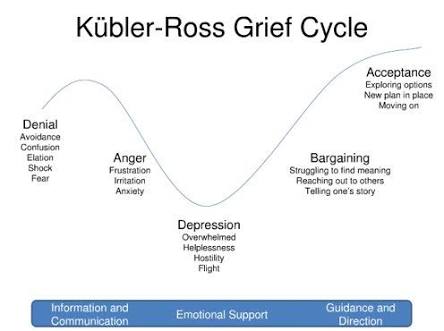
Anger is one of Elizabeth Kugler-Ross’ 5 Stages of Grief , and as Scott Peck reminds us, grief is a part of every transition. Say, we lose our job. While adrift, we stew. “I gave the best years of my life…” In time, we move on to another career, or discover that God had a reason for it. We accept it as a blessing. Still, anger was a real stage in our transition. When someone we love dies, anger often lashes out at an innocent bystander. It is human nature to shoot the messenger. We may be excited about moving to a new neighborhood, but soon reality sets in.
We may find ourselves alone, commuting further for work, and dealing with shoddy home construction. We may spend endless hours bemoaning the events and decisions that lead us to this new place. It is because Anger is a part of all transitions that the Bible retains even the final verses of Psalm 137: By the rivers of Babylon we sat and wept when we remembered Zion. There on the willow tree we hung our harps, for there our captors asked us for songs, our tormentors demanded songs of joy… …happy is the one who repays you according to what you have done to us. Happy is the one who seizes your infants and dashes them against the rocks. The Bible often speaks of anger, even though acting in anger is in opposition to the lives of compassion that Jesus calls us to live. The Bible gives voice to the human experience.
Psalm 137 always reminds me of the play/movie Godspell. In the scene were Jesus is about to be betrayed, the words of Psalm 137 form the lyrics and are sweetly sung — there is no anger expressed — for Jesus himself has gone all the way through the stages of his grief and come to acceptance. But for the disciples, it is a different story. When Jesus shares the last supper with his disciples, he tells them that one of them is about to betray him. On cue, Denial - stage one - hits the group. Their inability to remain awake in the garden speaks of Depression.
Peter picks up a sword in Anger. Judas goes to the council chamber and returns the thirty pieces of silver in an attempt to Bargain. The disciples are us. Acceptance comes slowly. I think it is first seen at the foot of the cross, as Jesus’ mother says good bye to her son (I’m thinking here of Michelangelo’s Pieta). Life always brings us to a new place. There will always be a resurrection. The people who sang about willows and harps and being exiled to Babylon, discovered a new way of living.
At some point, we all go through the five stages of grief. The thing we must remember, though, is not to get stuck. For many people, anger is a resting place, a familiar friend. Psalm 137 is about a nation. It is about a people who have lost their home and must now live in exile. It is a brutal transition. For workers in the traditional industries of our nation; coal, steel, heavy manufacturing, a similar transition is under way. Denial-depression-anger-bargaining is the mix that fossil fuels today’s social polarization and political debate. Can we hang up our harps on the willow tree and come to Acceptance? Will we be brave enough to fashion a new future?

